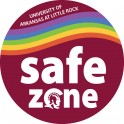How to Interact with and Assist Distressed Students
Any member of the UALR community may come into contact with a student in a state of severe distress. It is important to know how to identify the distress and how to interact with and deal with these behaviors. This brochure provides helpful ways to respond. We have also provided a clear list of campus resources available to assist in dealing with difficult situations. Remember you have on-campus resources and support to help you best assist students.
Signs of Psychological Distress:
- Marked changes in behavior, academic performance or class attendance
- Noticeable deterioration of hygiene or appearance
- Reference to harming self or others
- Persistent sadness or crying
- Strange behavior
- Nervousness, agitation, impaired speech, exaggerated movements
- High irritability or aggressive behavior
- Signs of drug and/or alcohol use
The Best Way to Help Students is to Communicate with Them
- Talk to the student in private
- Listen carefully to make sure you fully understand
- Praise the person for confiding in you
- Specifically acknowledge students’ distress and show empathy
- Do NOT be negative or judgmental
- Do your best to keep them talking
- Make use of campus resources
How to Deal with Suicidal/ Homicidal Thinking
Don’t be shy about direct questions concerning suicidal or homicidal thinking. In dealing with potentially violent behaviors you can ask the following:
- Are you thinking of harming yourself or others?
- Is there a suicide plan? A plan to harm others?
- If so, how will it happen?
- Where and when will an attempt be made?
Call Counseling Services (501-916-3185). If immediate threat exists, call the Department of Public Safety (501-916-3400) or 911.
Dealing with Disruptive Students
Sometimes a student’s behavior will become disruptive and endanger others or interfere with classroom or other university functions. In these situations remember you have the right to control the class for the good of all involved. The securing of a safe environment is always the TOP priority. You should call the Department of Public Safety whenever you feel there is a threat of violence or unlawful behavior. This includes a student’s refusal to leave after being asked to do so.
Intervening in Emergencies or Otherwise Assisting
If a student appears to be out of control or is acting in a strange manner, these guidelines may help.
- Contact Department of Public Safety in the event of a dangerous situation
- Remain calm and in control
- Set clear limits on behavior
- Identify the problem
- Offer your assistance
- Inform student of campus resources
- Be respectful but firm
- Be direct and repeat yourself if needed
- Convey support and understanding
- Ask if there are family or friends that can be called
Making a Referral to Counseling Services (CS)
- Express to the student that counseling is often helpful
- Encourage the student to call CS immediately on your phone – 501-916-3185
- Make the call to CS yourself while the student is with you
- Escort the student to CS, Student Services Center Room 119
- After 6:00 p.m. and weekends for counseling emergencies contact the Department of Public Safety at 569.3400.
Get Immediate Campus Help!
- Pick up blue light phones. The Department of Public Safety will always answer.
- Dial 501-916-3400.
- Dial 911.
- Additional external resources
- AR Crisis Hotline 888.274.7472
- National Suicide Prevention Lifeline 800.273.8255
- National Veteran’s Crisis Hotline 800.273.8255 – PRESS 1
- Crisis & Suicide Prevention for LGBTQ 866.488.7386
- National Graduate Student Crisis Hotline 800.472.3457
- TTY Hearing & Speech Impaired 800.799.4889
